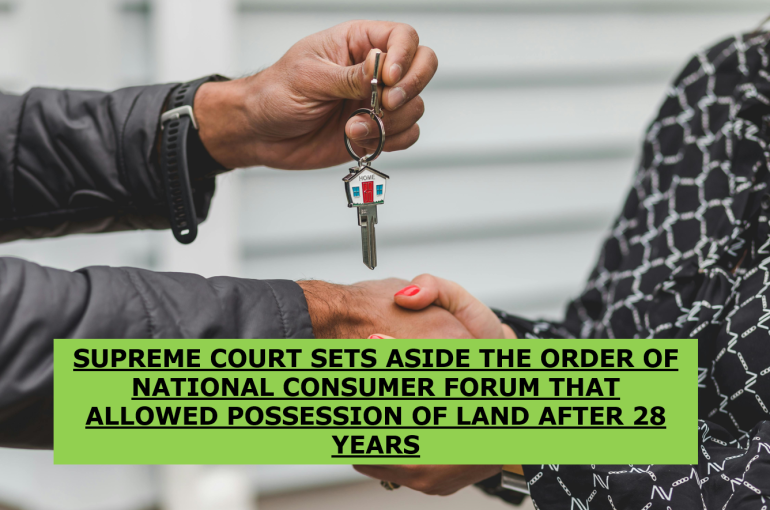SUPREME COURT SETS ASIDE THE ORDER OF NATIONAL CONSUMER FORUM THAT ALLOWED POSSESSION OF LAND AFTER 28 YEARS
A two Judge Bench of the Hon’ble Supreme Court comprising of Justice Bela M. Trivedi and Justice Satish Chandra Sharma passed a judgment in Indore Development Authority vs. Dr. Hemant Mandovra SLP (C) No. 14908 of 2023 wherein the Bench held that non-compliance with payment schedules, despite leniency, cannot justify claims for possession after an unreasonable delay.
Facts
The Indore Development Authority (IDA) which is a statutory body under the Town and Country Planning Act, 1973, issued an Advertisement on 05.10.1994, under Scheme No. 54, offering plots to the public.
The Respondent was allotted Plot No. 314 on 02.01.1995, with a payment plan requiring a 50% upfront deposit and the remaining 50% in 12 quarterly installments. Subsequently, the Respondent failed to pay the installments on time, leading to the cancellation of the allotment on 22.03.2000 by IDA. As the allotment got cancelled, the Respondent filed a Writ Petition bearing no. 174/2001 in the Madhya Pradesh High Court challenging the cancellation. The Hon’ble High Court directed IDA to restore the allotment upon payment of dues within 30 days vide Order dated 01.08.2006.
The Respondent tendered a partial payment of ₹5,72,782 in September 2006, against total dues of ₹12,02,592 which led to further disputes. Seeing the partial payment and non-compliance of Order of the Hon’ble High Court, IDA rejected the payment of the Respondent. Furthermore, IDA reduced the outstanding amount to ₹11,04,948 in 2009 but the Respondent still failed to pay the outstanding amount.
Subsequent to the High Court proceedings, the Respondent also filed a Consumer Complaint No. 391/2009 before the District Consumer Forum, which was dismissed in 2015 due to non-compliance of High Court Order. Pursuant to the dismissal, the Respondent appealed the decision of District Commission to the State Commission. The Ld. State Commission vide Order dated 15.12.2017 provided a balanced judgement and directed IDA to accept the payment with interest and handover the possession and thus granted relief to the Respondent.
Later, National Commission also upheld the Order passed by the State Commission and directed IDA to calculate interest and deliver possession of the plot vide Order dated 29.03.2023. IDA was directed to deliver the possession in 3 weeks from the date of receipt of such deposit.
As a last resort, IDA appealed to the Hon’ble Supreme Court wherein it contended that the Respondent failed to adhere to the payment schedule and ignored opportunities for compliance, making it unjust to demand possession after 28 years.
Meanwhile the Respondent contended that IDA had failed to deliver possession despite partial payments and legal proceedings.
Issues
1) Whether the National Commission was at fault at upholding the Order of State Commission and directing IDA to deliver the possession after 28 years.
2) Whether the Respondent repeatedly failed to furnish the payments as per the Court’s and Commission’s orders and thus could not be granted possession?
Decision by the Supreme Court
The Apex Court was of the view that Respondent defaulted on payments despite multiple opportunities, including an Order from the High Court in 2006. The Hon’ble Court noted the lapse of 28 years since the initial allotment, during which the Respondent repeatedly defaulted. Moreover, the National Commission’s directive to IDA to accept payment after 28 years was deemed untenable given the delay and non-compliance by the Respondent.
Furthermore, the Apex Court held that the IDA was justified in its actions for not providing the possession after such a long time and repeated defaults. The Hon’ble Court also observed that the Orders passed by the State and National Commission were against the principles of law.
Resultantly, the Appeal by IDA was allowed and the State and National Commission’s Orders dated 15.12.2017 and 29.03.2023 were set aside. Moreover, the Hon’ble Court also directed IDA to issue fresh tender in respect of the said plot by way of auction or by following the due process as per rules.
Conclusion
The Supreme Court highlighted that while consumer protection laws aim to safeguard rights, they cannot be stretched to favor non-compliance over decades. Moreover, the judgement also highlights the importance of adhering to contractual and judicial obligations while safeguarding the integrity of the legal process.
ARJAV JAIN
ASSOCIATE
THE INDIAN LAWYER & ALLIED SERVICES





































Leave a Reply